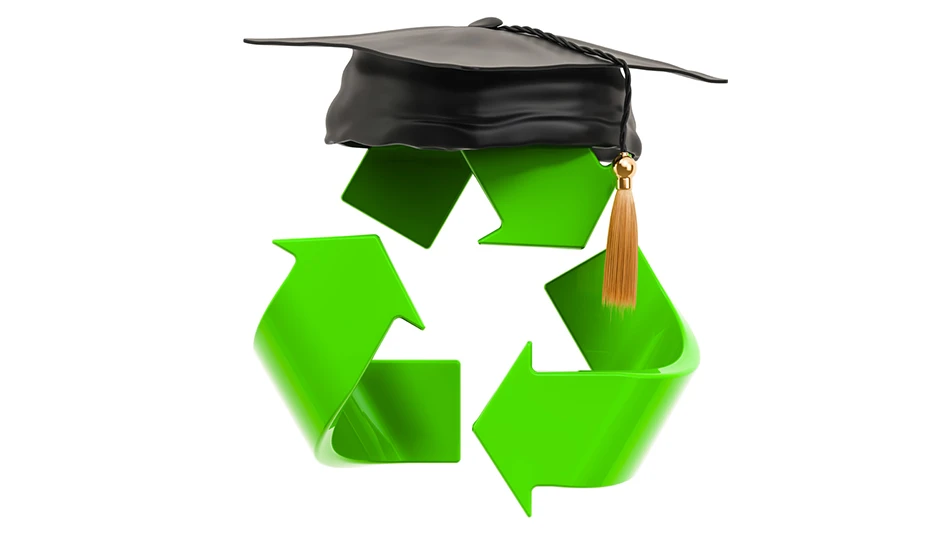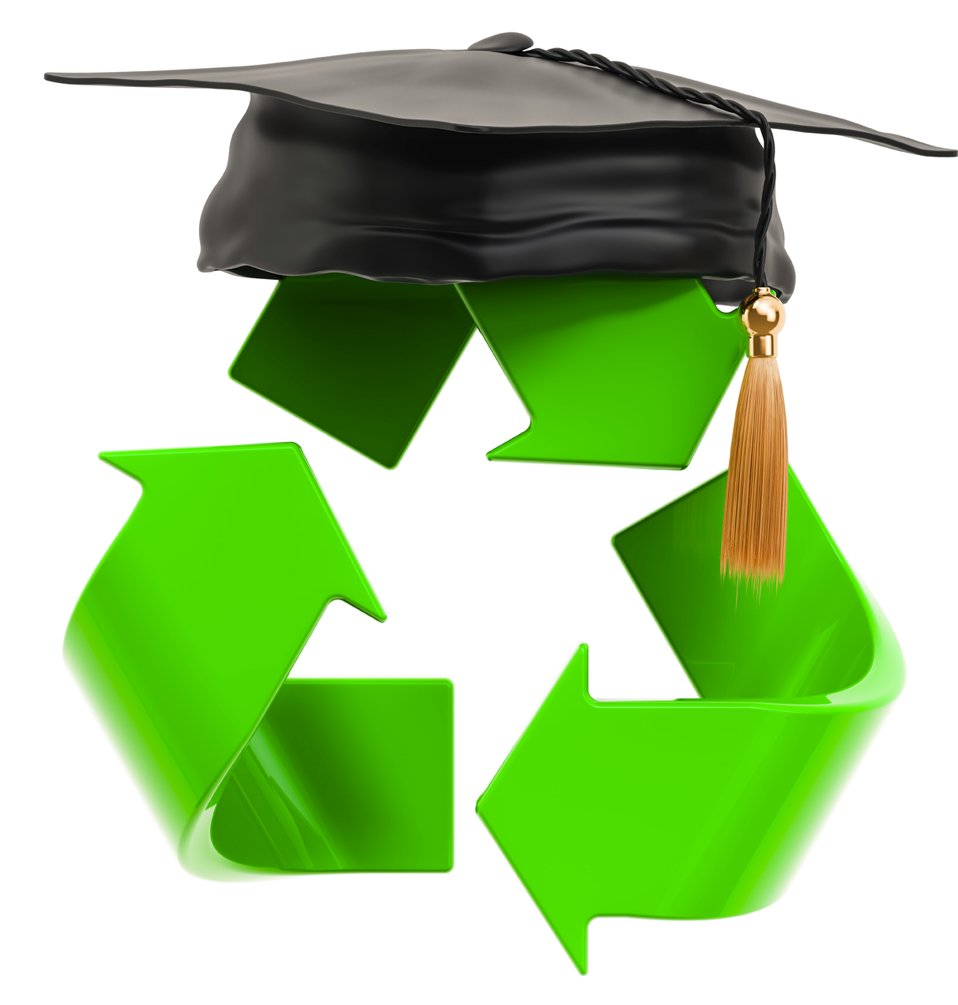
© alexlmx | stock.adobe.com

By encouraging future industry leaders, higher education institutions are playing an increasing role in nationwide recycling efforts.
Students’ passion for sustainability is represented every year by the Campus Race to Zero Waste, a competition held from January to March. The event, which is overseen by nonprofit RecycleMania Inc. and managed by the Reston, Virginia-based National Wildlife Federation, taps into school spirit to rally support for waste reduction.
Results from this year’s competing colleges and universities, which include 169 campuses across 41 U.S. states and two Canadian provinces, show how a bit of friendly rivalry takes recycling to new heights.
The Cardinals’ case
The University of Louisville (UofL) rounds out the top 10 in the Diversion category this year at 59.8 percent. Justin Mog, assistant to the provost for sustainability initiatives, attributes the school’s success to its robust single-stream recycling system and campaigns driven by student motivation.
UofL introduced single-stream recycling in 2010 when students were calling for a stronger commitment to sustainability. UofL launched the program alongside the Louisville Metro Government, Jefferson County Public Schools and Jefferson Community & Technical College through a collaboration called Partnership for a Green City. All four partners receive recycling services from Atlanta-based WestRock Co., which has a recycling facility in Louisville.
Mog says recycling has become easier for everyone on campus since then. In 2021, UofL recycled, reused or composted nearly 2.4 million pounds of material and, according to the university, the adoption of the recycling program allowed material to be recycled that previously was disposed of, including plastic bottles, aluminum cans and all forms of paper.
The university also has rolled out its Mini Bin Garbage Reduction program to promote smarter disposal habits among its staff. Those who work in campus offices were given quart-sized desktop green bins as their new garbage cans. Everything that is not recyclable, such as food waste or soiled napkins, should be discarded in the mini bin. Full bins can be emptied at a designated station on every floor or in any restroom.
A larger bin, serviced by custodians, at the side of every desk became a recycling container for plastic, aluminum, glass, paper and cardboard.
“That flipped the whole paradigm on its head in the way that people thought about trash,” Mog says. “The truth was, here you can recycle almost everything, and we want you to recycle, so we’re going to take care of it for you. If you are someone producing a lot of landfill trash, you have to manage it yourself.”
“It’s not just about recycling. We’re trying to get into broader sustainability behaviors, which I think also support each other. Once you start trying one thing, it tends to build [and] there’s a domino effect.” – Justin Mog, assistant to the provost for sustainability initiatives, University of Louisville
The university began a Commercial Dry Waste pilot in 2015 with the help of WestRock. In this program, WestRock completes waste audits at campus facilities that do not produce much food waste or other contaminants that would impair the recycling stream. Mog says the audits revealed that nearly 90 percent of the material in the dumpsters was recyclable, prompting UofL to get rid of landfill-bound dumpsters at certain buildings with limited wet waste. At these buildings, the university advises students and staff to dispose of food and bathroom waste in opaque black bags, which can be placed in the recycling dumpsters. All other recyclables can go into the same dumpster but must be put in clear bags to distinguish them from the wet waste.
“The custodial staff takes clear bags and black bags out and puts them in the same dumpster, then they get to the recycling plant and they don’t even rip open those black bags,” Mog says. “They just send those straight to the landfill and then everything that’s in clear bags they’re going to sort through.”
Other projects have provided opportunities to reuse and recycle in innovative ways. In 2013, students opened the Free Store to keep clothing, electronics, books and other useful items out of landfills. He describes it as a thrift store where no money is exchanged. This year, the store is holding a Trash to Treasure Move-Out where students who are moving out of the dorms can donate used items they don’t want to keep. Larger items such as lamps, rugs and furniture will be stored over the summer and featured at a free sale when students return in August.
A universitywide event called Ecolympics, which runs during the same time as Campus Race to Zero Waste, encourages students to share on social media any sustainable actions they’ve taken and offers them a chance to receive prizes. Mog says the Ecolympics incentivizes students to try something new and share their imaginative ideas with friends. Examples from this year’s Ecolympics include upcycling worn-out socks into gloves, keeping packing materials to reuse when wrapping gifts and reusing fabrics to make embroideries.
UofL also provides electronic and battery recycling. Since 2015, all the university’s e-scrap has been recycled by Powerhouse Recycling in Salisbury, North Carolina, which has several certifications, including the National Association for Information Destruction (NAID) AAA Certification, R2 and e-Stewards. Items from computers and hard drives to AC adapters, mixed computer cables and wires are accepted. UofL says it recycled more than 11,000 pounds of batteries in 2020, with collection and recycling managed by the Department of Environmental Health & Safety.
Mog says UofL’s recycling program is only one part of a broader objective to foster greener lifestyles around campus.
“For us, it’s not just about recycling,” he says. “We’re trying to get into broader sustainability behaviors, which I think also support each other. Once you start trying one thing, it tends to build [and] there’s a domino effect.”

Macalester makes it work
Macalester College in Saint Paul, Minnesota, finished in second place in the Diversion category with a rate of 72.6 and finished 10th in the Per Capita Classic category with 19.9 pounds of material recycled per person.
Megan Butler, sustainability director at Macalester College, says its recycling program was established on Earth Day in 1970 as a student-led project. Since then, it has embraced additional zero-waste policies and aims to achieve a 90 percent diversion rate. Butler says the current diversion rates are between 70 percent and 80 percent, depending on the day.
“We didn’t really realize what we were getting into, but it was helpful to see how we’re doing,” Butler says. “It catalyzed some conversations we weren’t having, and it gives us some ideal things to work toward into the future.”
Macalester implemented single-stream recycling in 2012, and Butler says it continues to develop its capacity to deal with specialty recyclables, such as lab gloves, plastic bags, padded envelopes and plastic foam.
She says Macalester takes a proactive approach toward zero waste with changes such as its 2011 campus ban on the sale of single-use plastic water bottles or its SustainaCup program, which provides free, reusable menstrual products through a partnership with Health Services.
Additionally, the university’s Office of Sustainability works with classes to collect trash, organics and recycling around campus, weighing and sorting material to see if the right items are being recycled or composted.
“That’s been a great activity,” Butler says. “The students involved, once they do that, once they’re hooked, they’re thinking about it and educating their friends.”
Butler says student-organized events such as Make Art Not Waste, an art show featuring reused materials, create an energetic environment. One student employee recently collaborated with Eureka Recycling, a Minneapolis-based recycler, to track waste production on campus. The project had 10 people on campus track their waste for 10 days. Butler says the hope is they will be able to compare student consumption in dorms to consumption data in other parts of the community.
Macalester works with organizations that share similar missions of social equity in the Twin Cities area, Butler says, including RePowered, a nonprofit in Saint Paul that hires people who have been incarcerated to recycle and refurbish electronics. Macalester also gives move-out donations to Bridging, a Roseville, Minnesota-based nonprofit that provides furniture and household goods for those transitioning out of homelessness and poverty.
“There’s interest in environmental justice and the good work that’s being done and highlighting that as well as building the capacity of our students to engage with that work in meaningful ways,” she says.
Butler says Macalester’s main goal is expanding recycling education resources and ensuring everyone on campus practices proper disposal habits.

Explore the May 2023 Issue
Check out more from this issue and find your next story to read.
Latest from Recycling Today
- Ocean Legacy Foundation expands plastic testing laboratory services
- CMI, HCPA publish aerosol recycling guide for MRFs
- 2026 Plastics Recycling Conference: A look at PCR contracts
- Remade Institute hosts Circular Economy Tech Summit & Conference in March
- Befesa sees record performance in 2025
- North Carolina county receives FRC foam recycling grant
- Cascades tissue business falls short in Q4
- GFL renews share repurchase programs





